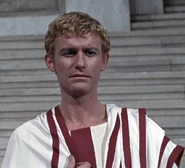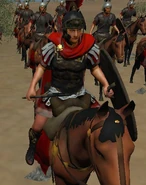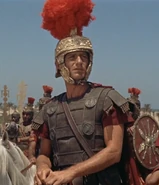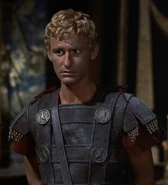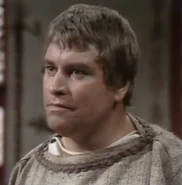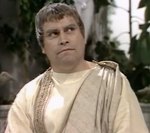
Augustus (23 September 63 BC-19 August 14 AD), born Gaius Octavius and also called Octavian, was the first Emperor of the Roman Empire, reigning from 27 BC to 14 AD. Octavian was adopted as the heir of Julius Caesar, and he succeeded him on his assassination in 44 BC. With Marcus Aemilius Lepidus and Mark Antony he formed the Second Triumvirate, defeating Caesar's killers Marcus Junius Brutus and Gaius Cassius Longinus at the Battle of Philippi in 42 BC and also defeating Sextus Pompeius at the 36 BC Battle of Naulochus. However, relations broke down and Augustus conquered both Lepidus' Rome and Antony's Rome, in addition to subjugating their client states. In 27 BC, Augustus declared himself Princeps, effectively making himself the supreme leader of the new Roman Empire. He reigned for forty years, and on his death he was succeeded by his own adoptive son Tiberius; it was rumored that his evil wife Livia had poisoned his figs while still on the vine, as, by then, Augustus only ate what he picked himself. During his reign, Europe entered a mostly-peaceful period known as the Pax Romana, and the Roman Empire would become one of the largest empires in history.
Biography[]

Octavian and his adoptive father, Julius Caesar
Known as Octavian in his youth, the Emperor Augustus was the adopted son of Julius Caesar. Only 19 years old when Caesar was killed in 44 BC, Octavian was not expected to prove a major player in the ensuing power struggle.
In 43 BC, he formed the Second Triumvirate (an alliance of three men) with Marcus Aemilius Lepidus and Caesar's right-hand man, Mark Antony. His decision to join Antony in his campaign to avenge Caesar's death put him in a subordinate role. When the pair faced Caesar's assassins, Brutus and Cassius, at Philippi in 42 BC, his military inexperience was only too evident. He escaped capture when his cmap was overrun by Brutus, but put up a determined defense while Antony routed the enemy.

Octavian in 42 BC.
Over the following years, Octavian's ruthlessness and single-minded pursuit of power proved more crucial than his command skills, which could be supplied by deputies such as Agrippa. Octavian's increasing rivalry with Antony culminated in a public quarrel in 33 BC and the triumvirate ended the next year.
His conduct of the civil war after Antony and Cleopatra's defeat at Actium and the annexation of Egypt in 30 BC showed implacable willpower, organizational ability, and a clear grasp of overall strategy.
A New Title[]

Augustus and Livia in 9 AD.
In effect, this victory made Octavian sole ruler of the Roman Empire, although republican forms were kept up. He was awarded the title Augustus, meaning "revered", in 27 BC. Augustus' throne had been won in war and rested on the support of the army.
He turned the legions into permanent formations with a strong sense of identity, while ensuring they were mostly employed far from Rome and were well rewarded. Augustus' four decades of absolute rule brought expansion of the Roman empire and much fighting at the periphery, but he no longer campaigned in person.
However, this did not stop him from taking credit for his legions' victories.



